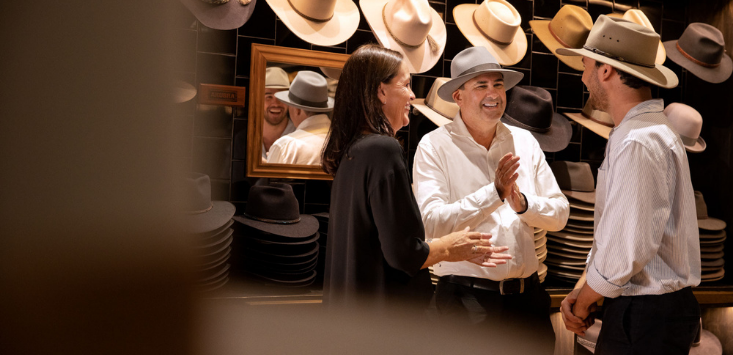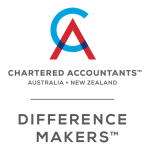
Hamish McLeod, manager of Strand Hatters. Source: supplied.
There are few brands more Australian than Akubra.
You may know it as the company that’s been supplying hats to the Australian armed forces since World War I, or think immediately of Paul Hogan in his iconic role as Crocodile Dundee.
Golfing legend Greg Norman has also sported an Akubra on numerous occasions. The hat designed for him, way back in 1987, was called ‘The Great White Shark’.
In short, this 140-year-old family business is steeped in a rich history, and its famous hats — still proudly made in Kempsey, NSW — are all about tradition and quality craftsmanship.
But while sticking to a “traditional recipe” on the production line can give you a unique competitive advantage, it’s maybe not so helpful in the back office.
Everything was handwritten
You know the story. It’s about business owners who are so focused on producing top-quality products that they have little time left over to worry about upgrading and re-engineering their back-end processes.
Luckily, all that changed 24 years ago, when the Keir family — owners of Akubra for five generations — brought on chartered accountant Roy Wilkinson to help them modernise and move with the times.
Roy is now CFO of Akubra and a board member, and thanks to his combination of forward-thinking and appreciation for Akubra’s heritage and expertise, Akubra were able to evolve their business game while staying true to who they are.
“When Roy first took over as the CFO at Akubra, all our accounts, everything, were still handwritten in ledger books,” says Stephen Keir, owner and managing director of Akubra.
And in a business where tradition is everything, “Roy respects our history and is very committed to our brand and values.”
Stepping it up with new systems
“Chartered accountants are highly valued for their versatile skill set and creative lateral thinking,” according to CAW, 2020 — Interbrand, Best Global Brands 2019, “and that’s why all of the top 100 Global Brands employ chartered accountants”.
Roy certainly put those skills to good use, helping Akubra modernise by setting up new accounting systems, and working with the business to establish e-commerce systems that reveal top trends and shopping times.
“These days you’ve got to keep current and you’ve got to have more ways of finding that right customer — and Roy’s helped us do that,” says Hamish McLeod, manager of Strand Hatters, an Akubra stockist.
“Roy’s created new systems that aggregate behaviour and purchasing data, generating insights to identify the best hats for the season and peak shopping times for customers.”
Roy also created an integrated digital supply chain, which gives Akubra-owned storefronts across the country a single view of inventory, allowing them to better serve their customers and, ultimately, to increase sales.
On top of all this, he has grown Akubra’s audience beyond rural Australia to untapped markets. Now, you’re just as likely to see an Akubra in a city setting as you are out in the country, such is the near trademark status of their legendary felt hats.
Keeping it in the family
Most meaningfully, Roy has helped Akubra with its mission to keep manufacturing viable on Australian soil
“A lot of manufacturers have gone offshore, especially in the textile industry,” Roy says, “because of the compliance cost of having to bring your factory up to date and your employees along for the ride.
“As a 140-year-old business, we weren’t interested in going offshore at all. Akubra is very much a fabric of the country, and all of us are committed to making sure that continues on for generations to come.”

Chartered Accountants Australia & New Zealand (CA ANZ) represents over 128,000 members globally.


COMMENTS
Reader comments have been turned off on this post.